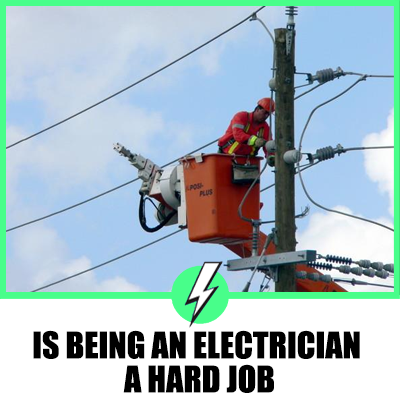Is Being An Electrician A Hard Job
Are you considering retraining to become an electrician? Will you be able to meet the mental and physical demands of working on site all day?
Being an electrician can be physically demanding. You are working with your hands all day, and you will find yourself crouching and crawling in small spaces. You will undergo a lot of training, so from that aspect, being an electrician is a job that needs aptitude and concentration.

Contents
What is an electrician?
An electrician is a highly trained person who deals with all aspects of electrical installation.
An electrician is a person who is tasked with the repair of electrical systems such as faulty wiring in a home—office, or industrial facility.
An electrician may be maintaining control systems for complicated processes in a factory or could be installing lighting in an office.
The job of an electrician is varied and can be complex in certain situations. An electrician works in many locations installing power into new homes around the country.
What’s it like to be an electrician?
To be an electrician, you will have extensive training as an apprentice. Your week would be one or two days of day release at a local college.
Working on-site as an apprentice with qualified electricians learning the trade, it will take 4 years to finish your college course and gain an NVQ Level 3 Diploma.
After that, you will work for a further two years, with your work potentially being signed off by an electrician who has registered as a competent person with an accredited outlet such as NICEIC.
Your work will be varied from rewiring houses to problem solving and resolution.
You may decide to become an industrial electrician and work in one location, such as an office block or factory.
Your work will be both physically demanding and mentally changing at times.
You will enjoy a higher salary than the other trades due to the responsibility you bring to the job and the potential risks of being an electrician.
What skills do electricians need?
You need to be physically fit and agile as a domestic installer electrician. You need good eyesight and cannot be colour blind.
You will need to focus and understand the concepts of how electricity works within your chosen industry. If you decide to be a domestic installer, you will need some interpersonal skills to deal with the public.
You will need robust maths to be able to calculate values and should be able to think quickly; you will learn diagnostic skills.
These are just a few skills a competent electrician needs to perform their daily tasks.
Who makes an ideal electrician?
You will need to have decent GCSE grades, including Maths, Physics, and English, as a minimum requirement.
You will gain the knowledge and practical skills required to perform electrician tasks through your training. Still, you will also need to be talented and have an excellent spirit to become part of a team or work autonomously.
You will need to communicate with your employer and colleagues precisely to understand clearly.
It will be an advantage to you if you can speak clearly to your clients and in a pleasant manner while conveying the needs of the jobs in simple terms.
Thinking on your feet is crucial for an electrician to solve problems without referring back to colleagues.
What is the personality of an electrician?
It’s normal for an electrician to be outgoing and comfortable in different surroundings. Electricians are pragmatic and have no problem getting to the root of the problem and finding a solution.
Almost all electricians who are domestic installers enjoy working on-site in customers’ homes, providing excellent service.
What are some things electricians do?
Electricians provide a variety of skills that go far beyond a few core aspects of the job; nevertheless, here are some things electricians frequently do:
- Inspect electrical systems for compliance and function
- Read technical and wiring drawings that an electrical engineer has produced before installation
- Install complete systems, part systems and work on and maintain electrical equipment.
- Troubleshoot and repair faulty electrical systems from wiring to appliances
- Stay current with the latest equipment and techniques, stay current with changing legislation and industry practises
Are electricians in-demand in the UK?
Yes, the electrician is always in demand and highly paid for his work out of all the trades.
If you are an electrician, you can command high pay rates. Many electrician positions in the UK are unfilled due to demand outstripping the supply of well-qualified electricians.
The short supply of electricians is across all sectors, and electricians can pick and choose their jobs and salaries.
How much do electricians charge per hour in the UK?
It varies considerably on a couple of factors, what the competition is charging and if you live and work in a major city.
The hourly rate is up to 60 pounds per hour and will increase further as qualified electricians become scarce as fewer apprenticeships are being taken.
With earning as much as 480 pounds for an 8 hour day, electricians’ pay is comparable with some of the high paid professions of senior managers.
If you are on call, you can expect to pay an additional 100 pounds to call out an electrician at an unsocial hour.
Of course, that’s just the labour rate, and wiring and parts are in addition, as is VAT.
Does the UK need more electricians?
The UK is heading down the rabbit hole of a skills shortage across many sectors, and it’s presently reported that the UK needs an additional 5000 electricians over the next five years.
Some of these positions will be filled by older people retraining and entering the industry. The older trainee brings a lot to the table with life experience. Still, unfortunately, there are no shortcuts to qualifying as an electrician.





